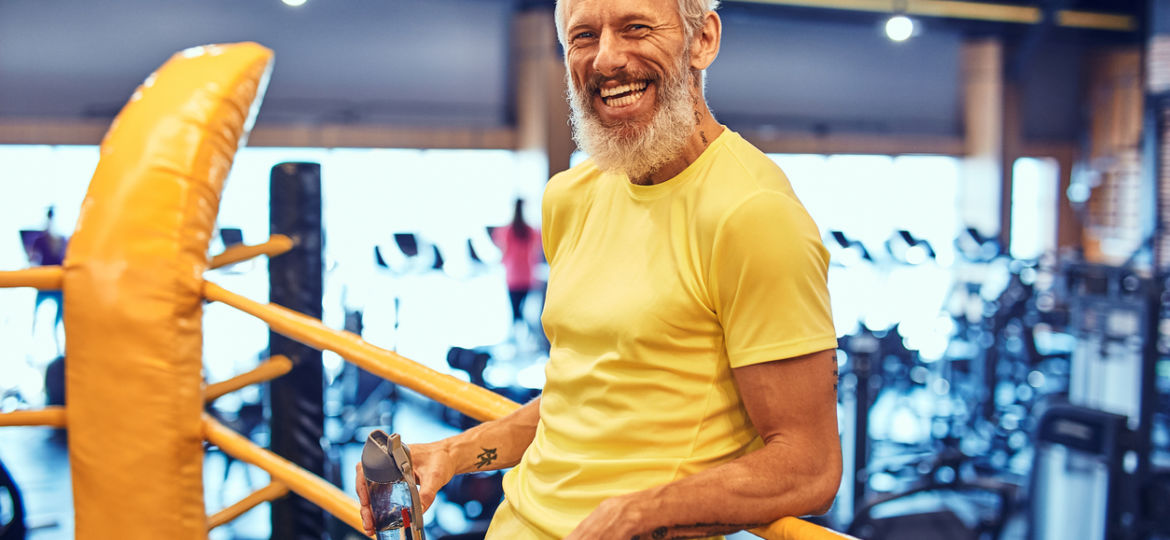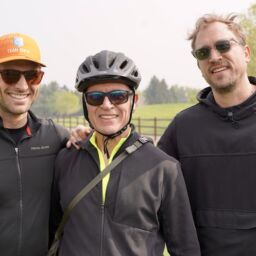Written by Brett Miller, PT
Boxing, they say, is as much a match of mental agility as it is physical ability. Anyone who has ever trained and stepped into the ring knows this is true. Inner struggle and mental warfare are pervasive themes in boxing. We know boxing is a sport that forces individuals to look deep inside themselves and discover who they are and who they want to be. Some of the world’s most famous and greatest boxers of all time have faced not only their relentless opponents but also themselves.
Doesn’t this boxing match sound synonymous with the ongoing fight against Parkinson’s? Throwing your combinations, getting backed into the corner, sticking and moving, jabbing and uppercuts—all mixed with the inner struggle, unpredictability, mental warfare, physical and mental fitness.
Research and testimonials support the science of boxing and why it’s a “go-to” exercise for many people with Parkinson’s. Research performed by a group of sports scientists from the US Olympic Committee came to a surprising conclusion that, pound for pound, based on ten different athletic skills, the most demanding sport in the world is boxing. Endurance, strength, power, speed, agility, flexibility, hand-eye coordination, and mental aptitude were among the tested categories.
To anyone who has ever boxed, this conclusion makes perfect sense. When I talk about boxing, I explain it as a “one-million-mile-per-hour chess game.” You are planning your next five offensive and defensive moves while also carrying out and executing the present move while also maintaining the ability to reflect and change course at a second’s notice.
This is why boxing is so tough, whether you have Parkinson’s or not—but also why it is incredibly successful at managing Parkinson’s symptoms.
The intense training of boxing-specific exercise (non-contact), otherwise known as high-intensity interval training (HIIT), profoundly impacts neurological fitness and neuroplasticity. Research points to the fact that high-intensity exercise has a neurological protective response to the destruction of dopamine cells. Additionally, when we engage in high-intensity exercises like boxing, we release a protein from the central nervous system known as brain-derived neurotrophic factor (BDNF). The critical roles of BDNF are to optimize memory, sharpen our learning process, speed up the synapse of our motor neurons (synaptogenesis), and create neurogenesis, the process by which new neurons are formed in the brain. The science of boxing enables this. When done two to three days per week as prescribed by a licensed exercise professional, it can be the difference between living with Parkinson’s and living your best life with Parkinson’s.
 There are numerous additional benefits from the high-intensity sport of boxing: improvements in eye tracking, peripheral awareness, hand-eye coordination, ability to change focus on many objects, reaction times, contrast sensitivity, dynamic visual acuity, depth perception, and hemispheric transference. Boxing to manage Parkinson’s has also been shown to improve range of motion, strength, functional mobility, and confidence, and it has been shown to decrease the risk of falling.
There are numerous additional benefits from the high-intensity sport of boxing: improvements in eye tracking, peripheral awareness, hand-eye coordination, ability to change focus on many objects, reaction times, contrast sensitivity, dynamic visual acuity, depth perception, and hemispheric transference. Boxing to manage Parkinson’s has also been shown to improve range of motion, strength, functional mobility, and confidence, and it has been shown to decrease the risk of falling.
On top of all these benefits, the camaraderie built with your fellow fighters and coaching staff is invaluable for people living with Parkinson’s.
So, how can you begin to reap all of boxing’s benefits?
As a physical therapist specializing in working with people with Parkinson’s, my recommendation to most people would be to begin a boxing program two or three days a week. Check with your physician to get the go-ahead, then seek out a credentialed trainer experienced in proper boxing technique who also knows proper modifications for exercise programming and Parkinson’s. Working with someone who understands Parkinson’s and its typical motor and non-motor symptoms (and their response to high-intensity exercise) is important for preventing injury and minimizing other possible risks.
Equally important is finding a place that welcomes you home. Seek out a facility or center where you will enjoy spending time two, three, even five days a week. A place where you can feel vulnerable, real. A place where you can let it all go without ego or judgment. A place where the coaches are professional, and the camaraderie shows up in the form of family gatherings and support groups outside of the facility. Where everyone knows your name and lifts you up. Find a boxing center and community with this combination, and you will be the worst enemy Parkinson’s has ever seen. You will triumph.
When you doubt this, remember Muhammad Ali’s words:
“Impossible is not a fact. It’s an opinion. Impossible is not a declaration. It’s a dare. Impossible is potential. Impossible is temporary.”
About Brett Miller
Brett Miller is a licensed physical therapist with 26 years of experience in sports therapy, acute and intensive care, long-term care, and wound care. He has worked in the fitness industry for 24 years with extensive experience in kickboxing, boxing, spinning, rowing, and strength and conditioning. He is the founder and owner of 110 Fitness and the head coach of Rock Steady Boxing South Shore. He has worked as the strength and conditioning coach for world-class boxers and Olympic athletes, focusing on injury prevention and rehabilitation.
Additionally, Brett Miller has been the owner and operator of Boston Orthotics, Inc., for the past 17 years. He was also an adaptive sports coach at New England Disabled Sports at Loon Mountain in Lincoln, NH, for 18 years. Brett is a US Army veteran, a PWR!Moves® Certified Therapist, and is certified in Concept 2 Rowing, Pedaling for Parkinson’s, SCW Boxing Fitness, SCW Aquatics Exercise, Tai Ji Quan: Moving for Better Balance, CPR/AED, and is a licensed boxing second in the state of Massachusetts. Brett serves as a Davis Phinney Foundation Ambassador and is also a research consultant for innovative US research companies, prominent Boston hospitals, and the Cleveland Clinic.
learn More Living-Well Strategies
You can find much more in our Every Victory Counts® manual. It’s packed with up-to-date information about everything Parkinson’s. Request your free copy of the Every Victory Counts manual by clicking the button below.
Thank you to our 2021 Peak Partners, Adamas, Amneal, Kyowa Kirin, and Sunovion, as well as our Every Victory Counts Gold Sponsor AbbVie Grants, Silver Sponsor Lundbeck, and Bronze Sponsors Supernus and Theravance for helping us provide the Every Victory Counts manual to our community for free.

















